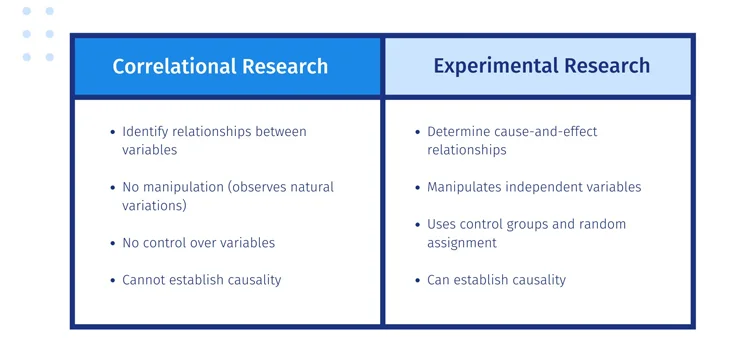Example Of Correlation Research
Correlation research examines the statistical association between two or more variables to determine the degree of relationship between them. An exemplary instance of correlation research involves investigating the connection between study time and academic performance among students. In this scenario, study time is the independent variable, and academic performance is the dependent variable. By collecting data on these variables from a sample of students, researchers can employ statistical methods to analyze the correlation. It is essential to incorporate controlled variable, such as prior knowledge or socio-economic factors, to ensure that the observed correlation is not influenced by external factors. By systematically manipulating and measuring variables while controlling for potential confounding elements, researchers can elucidate the strength and direction of the correlation. This type of research aids in understanding the interplay between variables, providing valuable insights for educators and policymakers aiming to enhance educational strategies and outcomes.
Defining Correlational Research
Correlational research is a scientific method employed to investigate the relationship between two or more variables without manipulating them. The primary focus is on assessing the degree of association or correlation between variables, often quantified through statistical measures. In this context, understanding controlled variable definition is crucial. Controlled variables are factors that researchers intentionally keep constant during an experiment to isolate the impact of the independent variable on the dependent variable. In correlational research, however, controlled variables are limited as the study primarily observes existing relationships in natural settings. Unlike experimental designs where researchers manipulate variables, correlational studies rely on observing and analyzing patterns without intervening. While these studies can reveal valuable insights and patterns, they cannot establish causation. Researchers must carefully consider and account for potential confounding variables to ensure the validity and reliability of their correlational findings. Overall, correlational research provides a valuable approach for exploring associations and patterns in diverse fields, offering insights into the complex interplay of variables.
Why Does Correlational Research Exist?
Correlational research exists to explore relationships between variables and identify patterns or connections within a given phenomenon. Unlike experimental research, correlational studies do not manipulate variables but observe them as they naturally occur. This approach is valuable when ethical or practical constraints limit experimentation. Researchers employ correlational studies to uncover associations, make predictions, or generate hypotheses for further investigation. Controlled variable examples demonstrate the method's rigor, ensuring that extraneous factors do not confound results. By accounting for these controlled variables, researchers can discern genuine correlations from mere coincidences. This type of research is especially useful in fields like psychology and sociology, offering insights into complex human behaviors and societal trends without imposing experimental interventions.
Different Correlation Types
Correlation, a statistical measure, gauges the relationship between variables. There are diverse correlation types, each offering unique insights. Pearson correlation quantifies linear associations, measuring the strength and direction of a linear relationship. Spearman correlation assesses monotonic relationships, suitable for non-linear associations. Kendall correlation is adept at detecting concordant and discordant pairs within datasets. Beyond these, partial correlation isolates specific relationships, considering the influence of other variables. Variable solver tools enhance correlation analysis, aiding in uncovering patterns and dependencies. By employing these correlation types alongside variable solvers, researchers gain a comprehensive understanding of complex data interdependencies, empowering them to make informed decisions and predictions across various domains, from finance to scientific research.

What Distinguishes Correlational From Experimental Research?
Correlational and experimental research methods are distinct in their approaches to understanding relationships between variables. Correlational research explores associations between two or more variables without manipulating them, relying on statistical analyses to identify patterns. In contrast, experimental research involves deliberate manipulation of independent variables to observe their effects on dependent variables, aiming to establish causation. Assignment provider, such as those offering assignment help in Perth, recognize the importance of distinguishing these methods for academic success. While correlational studies reveal connections, experimental designs enable researchers to infer causality, contributing to a deeper understanding of phenomena. Expert guidance from assignment help providers ensures students grasp these differences, fostering critical thinking and research skills essential for academic excellence in Perth and beyond.
What Benefits Does Correlational Research Offer?
In the realm of academic writing help, correlational research serves as a valuable methodological tool, offering distinct benefits to researchers. This approach enables scholars to investigate relationships between variables without manipulating them, providing insights into associations and patterns within real-world contexts. Correlational research allows for the exploration of complex phenomena, offering a nuanced understanding of interconnections between factors. It contributes to the development of theories by identifying potential links, guiding subsequent experimental designs. Additionally, this method facilitates the prediction of outcomes based on observed correlations, aiding practical decision-making. While not implying causation, correlational research fosters a foundation for further investigation and hypothesis generation. In academic writing, leveraging correlational research enriches scholarly discourse by deepening comprehension of intricate relationships and fostering evidence-based discussions.
What Are The BookMyEssay Correlation Research Assignment Help Reviews By Students?
BookMyEssay's Correlation Research Assignment Help has garnered positive reviews from students who appreciate its comprehensive Assignment Writing Guide. The service has proven instrumental in aiding students in understanding and implementing correlation research concepts effectively. The reviews highlight the platform's commitment to providing insightful guidance, ensuring a seamless learning experience. Students commend the user-friendly interface and personalized assistance, emphasizing its value in simplifying complex correlation research assignments. The Assignment Writing Guide offered by BookMyEssay is recognized for its clarity, depth, and relevance, catering to diverse academic needs. As evidenced by the reviews, students find the platform reliable, efficient, and crucial in enhancing their understanding of correlation research, making it a go-to resource for academic success.







 3 Bellbridge Dr, Hoppers Crossing, Melbourne VIC 3029
3 Bellbridge Dr, Hoppers Crossing, Melbourne VIC 3029




